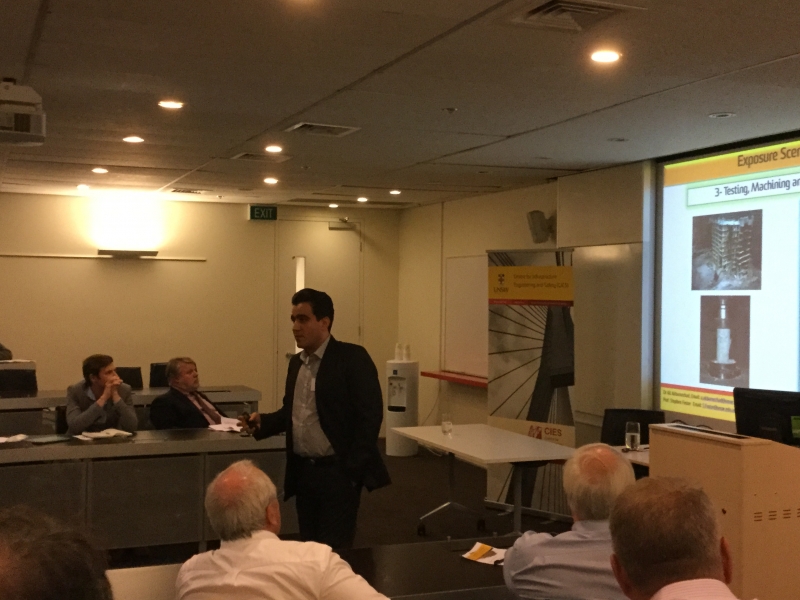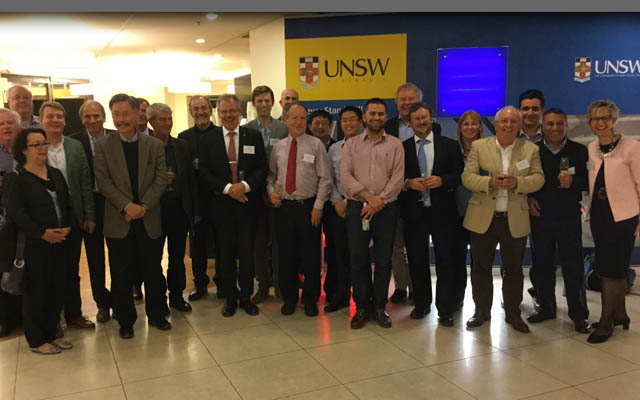CIES Workshop - on the Engineering of Advanced Cementitious Materials and Durable Structures.
 On Friday 28th August, CIES hosted an important Workshop initiative titled: “The Engineering of Advanced Cementitious Materials and Durable Structures” which was held at the UNSW CBD Campus in Sydney.
On Friday 28th August, CIES hosted an important Workshop initiative titled: “The Engineering of Advanced Cementitious Materials and Durable Structures” which was held at the UNSW CBD Campus in Sydney.
The workshop attracted high profile National and International speakers and attendance from industry leaders, CIES academics and research staff and visiting members of fib (International Federation for Structural Concrete).
Concrete is made up of cementitious materials, aggregates, water and various additives. The cementitious materials form the glue that holds concrete together, and include traditional Portland cement and other materials, such as fly ash, ground granulated blastfurnace slag (GGBS), limestone fines and silica fume. When mixed with water, the cementitious materials provide the plasticity and workability required to place and finish the wet concrete, and after setting, they impart strength and stiffness to the hardened concrete.
The workshop was an opportunity for recent research advances in this important area to be shared with a group of key influencers from both the academic and industry spheres. The day was divided into 2 sessions.
The first Session covered Advanced Cementitious Materials Engineering and the Keynote address titled “Investigation of early hydration dynamics and microstructural development in ordinary Portland cement using 1H NMR relaxometry: Effects of retardants and implications for resultant bulk mechanical properties” was given by Professor David Waite, Deputy Dean (Strategic Initiatives), UNSW Engineering and Scientia Professor in the School of Civil and Environmental Engineering at UNSW.
Other presentations in this session were delivered by:
Professor Frank Dehn - CEO MFPA Leipzig, Germany; Deputy Chair fib Technical Council and Chair fib Commission 4 Concrete and Concrete Technology
“Novel binders – development, application and standardization”
Dr Ali Akbar Nezhad – Senior Lecturer, Construction Innovation and Research Initiative (CIRI), School of Civil and Environmental Engineering (UNSW)
“Carbon nanofibres in concrete: Safety challenges and solutions”
Professor Marco di Prisco - Professor of Structural Design, Department of Civil and Environmental Engineering, Politecnico di Milano
“FRC structural behaviour in case of fire and blast”
The second Session covered DURABLE STRUCTURES and the Keynote address titled “Enhancing sustainability of concrete structures by eco-efficient and durable concretes and service life design” was given by Professor Harald Müller - Institute of Concrete Structures and Building Materials, Karlsruhe Institute of Technology (KIT), Karlsruhe, Germany and current President of fib.
Further presentations in this second session were made by:
Associate Professor Arnaud Castel, CIES (UNSW): “The assessment of rapid durability testing methods for alkali activated concretes”
James de Burgh, CIES (UNSW) PhD Candidate: “Experimental evaluation of sorption-desorption in cementitious materials at elevated temperatures”
Frank Papworth BCRC - Managing Consultant and Deputy Chair fib Commission 8 – Durability “Overview of CIA development of durability recommended practices”
Emeritus Professor Ian Gilbert - Deputy Director, CIES conducted the Panel Discussion: Research in cementitious materials engineering – future directions and strategies and included enthusiastic participation and discussion between the speakers and the audience which included Industry invitees from Sydney Water; HBM Group; Concrete Institute of Australia; Adelaide Brighton Cement; Cement Concrete & Aggregates Australia; Boral Concrete; S.A. Water; BOSFA – DRAMIX and Australian Steel Mill Services (ASMS).
 |



